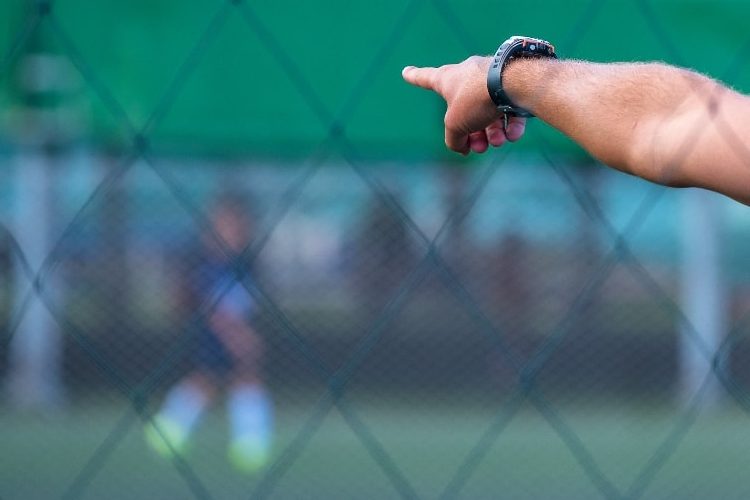This page may contain affiliate links, meaning we receive a commission if you decide to make a purchase through our links, but this is at no additional cost to you. Please read our privacy statement for more info.
What sets the greatest coaches apart from the rest?
Great coaches are able to get more out of their athletes, develop mindsets year after year for decades, and build cultures of winning. They are successful because they have a consistent set of values and goals which guide their actions. They are successful because they are driven by something greater than wins and loses.
A youth coaching philosophy is a statement, usually a couple of sentences, declaring what you value most, and how you will achieve those ideals in your role as a coach. It also guides your approach to interacting with your athletes, player development, winning and losing, and how you strive to behave as a leader.

Your coaching philosophy is the foundation for everything you do as a coach.
Coaches must have a clear vision. We are the leaders our athletes look to, not only on the field but off the field as well. We shape the lessons they learn through sports, the people they will become. This is a big responsibility.
Why Is a Coaching Philosophy Important?
…Particularly When Working With Young Athletes?
By developing a coaching philosophy, you will equip yourself with a vision: where you want to go and how to get there.
You will navigate the difficult ethical and moral decisions all coaches must make with consistency and clarity of purpose. Most importantly, you will set the right example for your athletes to follow.
Every coach has a coaching philosophy, most just don’t take the time to sit down and examine theirs. However, this leaves the door open for indecisiveness, inconsistency and unclear leadership.
Developing a coaching philosophy in youth sports is particularly important because it is a crucial developmental stage in children’s lives. Kids are impressionable and need strong guidance to make the right decisions, helping them understand right from wrong.
As their coach, you provide that guidance. The direction you lead them in will stay with them long after they have left your team.
Throughout the rest of this article, we provide 6 tips that will guide you through the creation of your own coaching philosophy, putting you on the path to becoming a great coach in your own right!

1. Learn From The Greats
Whether coaching youth sports or professional athletes, coaching is coaching. There are lessons to be learned from the great coaches at all levels and in all sports.
This is especially important for newer coaches, who may not have years of personal experience to lean back on. However, all coaches should strive to continue learning and growing, regardless of their level of experience.
Don’t try to reinvent the wheel!
Your first step is to look towards the giants who have come before you, and learn the lessons they have left behind. Many great coaches have written books or memoirs speaking to how they achieved the success they were able to. So think of a few coaches you look up to and start reading!
If you are having trouble finding resources, check out a few of the great titles listed below:
- Eleven Rings: The Soul of Success by Phil Jackson
- You Win in the Locker Room First: The 7 C’s to Build a Winning Team in Business, Sports, and Life by Mike Smith and Jon Gordon
- Reach for the Summit: The Definite Dozen System for Succeeding at Whatever You Do
- Legacy by James Kerr
- Vince Lombardi on Leadership: Life Lessons from a 5-Time NFL Championship Coach
This list has a great spread among sports and eras, with some of the greatest coaches in history outlining exactly what they did to achieve success in their respective sports.
It is a great starting point for any coach, especially coaches new to the game!

2. Reflect on Why YOU Coach
Tell me in one sentence: Why do you want to be a coach?
If you’re finding this difficult, don’t worry. Without practice at self-reflection, it can be difficult to sort through all of the myriads of reasons you want to help shape young lives and distill it into one sentence.
Yet this step, this self-reflection, is absolutely essential for developing a coaching philosophy. For developing your coaching philosophy.
Your coaching philosophy is something deeply personal, something that ultimately stems from and applies to only yourself. So understanding yourself is the key to developing a complete philosophy.
Understanding what drives you, what you value most and the underlying reasons why will lay a foundation upon which a strong coaching philosophy can be built.
Here are a few exercises to help guide you through the process!
In One Sentence
Just as I said before, reflect deeply on why you want to be a coach. Then work to distill it down to one sentence.
Don’t try to fit in everything, this isn’t your entire coaching philosophy. Just a piece of it. But by simplifying why you want to be a coach, you cut straight to the heart of why you want to do what you do.
Some examples might be:
“I want to be a coach to teach young women and men valuable life lessons they can only learn from competition.”
or
“I want to be a coach to create a new generation of leaders and champions.”
Whatever your reason, write it down and keep it on hand. It will help guide you throughout your entire coaching journey.
Three Key Values
Another exercise designed to help set your priorities, the Three Key Values explores the set of values that will guide your actions and behaviors as a coach.
The exercise is simple: choose the three most important values to you as a coach.
Now obviously there are more than three values important to you, I am not saying that you can only adhere to these three.
But by forcing yourself to choose only three out of hundreds of available values, you are again developing greater awareness of what you care most about as a coach.
For example, some coaches may prioritize sportsmanship over competitiveness. In this instance winning and competition take a back seat to becoming a good sport. Not in every single case, but as a general rule.
Reflect on the many values kids can learn through sports, and then decide which three mean the most to you.
Defining Success
What does success mean to you?
Another difficult answer, yet essential as well. What does success actually look like to you? As any blindfolded darts thrower will tell you, it’s almost impossible to hit a target you can’t see.
So define your target!
Again, try to limit yourself to one or two sentences. Simplicity breeds clarity.
Examples here might include:
“Success on my team means an athlete pushing themselves to, and then beyond, their own limit regardless of victory or defeat”
or
“Success on my team means learning how to work together as a team, not merely as individuals.”
Lean on your values and your why statement to help you define success. Making sure that your values and definition of success are in line with each other ensures you will have a consistent and clear philosophy informing your decisions as a coach.

3. Define Your Objectives
Now that you know why you coach and what success looks like, you can plan out how you will get there!
This will include more prioritization, but this time with clearer objectives and structured goals specific to your team and your sport.
Depending on the team, your objectives may also change from season to season. Maybe one year you get a team with fantastic talent, but can’t work together so you prioritize teamwork.
However, the next year you may get a team with undeveloped potential who need more of an emphasis on player development.
Your values should be solid, whereas your objectives can be a bit more fluid depending on the specific team and their needs.
Your objectives and goals will be built around the following areas:
- Teamwork: Teaching your athletes to play as a team, not just as individuals
- Individual Development: Bringing out the best in each individual athlete
- Mindset Development: building resilience and determination in your athletes (especially important for youth)
- Competitive Performance: Your goals in terms of winning and competing (win state, make it to regionals, etc.)
- Player Enjoyment: Ensuring that your athletes have fun and enjoy what they do
Decide on your goals in each of these areas, and which you will choose to focus on the most.
For example, if you choose to prioritize player development you may be willing to sacrifice some wins at the beginning of the season (competitive performance) in order to focus on the long-term development of your athletes.
However, make sure that you find balance among all of these objectives. A deficiency in any area makes for an unbalanced and incomplete approach.
There have been some amazing coaches, who could develop their athletes and achieve victory, but have lost the love of their entire team because they never learned to lighten up and have a bit of fun!
The greats find a way to do a bit of everything.

4. Use Your Objectives to Structure Your Season
We started with some abstractions, but now we arrive at the tangibles and specifics.
Now that we understand our values and objectives, we can use them to actually structure our practices and plan out our season.
For example, if you put an emphasis on player development in the previous step then your practices will focus on exactly that: player development. You will want to focus on building skills and competencies, reinforcing the fundamentals and equipping your players with a growth mindset.
This may come, as mentioned before, at the cost of wins towards the beginning of the season. Just remember your priority and stay on that mission.
If you chose to focus on development then your record doesn’t matter as much as helping your players improve and teaching them to prioritize growth over victory.
Some coaches, on the other hand, just want to make the game fun! In this instance, make sure to include plenty of fun and games in your practices.
Also, communicate to your athletes that sports should be fun and help them to find the fun even in defeat. This might mean heading out for some team dinners at a restaurant, especially after a tough loss.
Whatever you choose to prioritize, make sure that you structure your practices, communication with the team and your long-term plan for the season around those priorities. This will give your team a vision and direction for where they are headed.

5. Anticipate Difficult Situations
These are inevitable.
Every coach faces difficult situations at some point, and they are the hardest part of being a coach. But they are a part of it.
The job isn’t all sunshine and butterflies, nor should it be. Coaches have a great responsibility and any great responsibility comes with difficulties. However, anticipating these situations and reflecting on how you will respond, in accordance with your philosophy, will make these things go much more smoothly.
For example, maybe you prioritize having fun or sportsmanship but one of the parents on the team only wants their kid to think about winning. What will you do?
Or what about if one of your athletes has had enough after a crushing loss and decides they want to quit?
What will you say to your team if you make it to the championship game and lose?
These situations are difficult, but an inevitable part of sports. It’s part of the reason we play the game. Life goes much the same way and kids learning to navigate these difficult situations at an early age through sports invariably make for more well-adjusted adults.
But they will need help. They will need guidance. They will need their coach.
So prepare yourself. Try to think of every difficult situation you might encounter and plan how you will react in accordance with your coaching philosophy.
Things may not always go as planned, but having a plan in place will surely make them go a lot better.

6. Communicate Your Coaching Philosophy
Now it is time to write and communicate your coaching philosophy!
The simplest form would be as follows:
My definition of success is ____________________________________. On my team, we will achieve this through ______________________________________________.
(objectives)
For example:
“My definition of success is being better at the end of the season than we were at the beginning. On my team, we will achieve this through focusing on developing a growth mindset, working on the fundamentals, and prioritizing long-term growth over short term satisfaction.”
By clearly stating what your definition of success is, and the measures you will take to achieve it, you are telling everyone exactly what you believe in as a coach. Then, when you act in accordance with those beliefs, nobody will be surprised.
Some coaches may be asking, “Should I actually share my coaching philosophy with my athletes and the parents?”
In short: yes!
Especially in youth sports, parents want to know the values guiding their child’s development. Clear communication is essential to letting the parents know their child is in good hands and is learning important life lessons, as opposed to just playing a game.
It’s also important to share with your athletes. Kids can, and should, understand why they are being asked to do what you’re having them do. The days of “because I told you so,” are long gone and, if you follow modern psychology, probably never should have happened in the first place.
Buy-in from both the athletes and their parents is essential, so communicate your vision and get everyone on board with it!

Next:
- What is the Best Sports Video Editing Software & Apps?
- The Ultimate Guide for New Youth Wrestling Coaches
- The Complete Coaches Guide to Youth Sports Injuries
- Should There Be Equal Playing Time in Youth Sports?
Final Thoughts For Developing Your Youth Sports Coaching Philosophy
Whew!
We definitely just went through the ringer. There’s been self-reflection, value identification, goal and objective setting, and even anticipating some difficult situations.
This is why we get to hand out the penalties at practice…. we’ve just done the mental and emotional wind sprints!
All of this work, however, will pay dividends in the end. You now have a well-developed, clear and strong personal coaching philosophy that will guide you throughout your entire journey as a coach.
Your coaching philosophy is vital to becoming a great coach. It is the foundation upon which your values, objectives, and actions as a coach are built. Only with a strong foundation, can we become the strong leaders our athletes need.
And now you have one.
Time to go out there and change some lives, congratulations Coach!
Daniel
This page may contain affiliate links, meaning we receive a commission if you decide to make a purchase through our links, but this is at no additional cost to you. Please read our privacy statement for more info.

